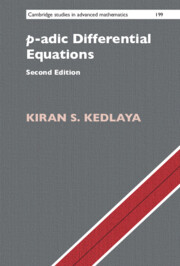Book contents
- Frontmatter
- Contents
- Preface
- Acknowledgments
- 0 Introductory remarks
- Part I Tools of p-adic Analysis
- Part II Differential Algebra
- Part III p-adic Differential Equations on Discs and Annuli
- Part IV Difference Algebra and Frobenius Modules
- Part V Frobenius Structures
- Part VI The p-adic local monodromy theorem
- 20 The p-adic local monodromy theorem
- 21 The p-adic local monodromy theorem: proof
- 22 p-adic monodromy without Frobenius structures
- Part VII Global theory
- Appendix A Picard–Fuchs modules
- Appendix B Rigid cohomology
- Appendix C p-adic Hodge theory
- References
- Index of notation
- Subject index
20 - The p-adic local monodromy theorem
from Part VI - The p-adic local monodromy theorem
Published online by Cambridge University Press: 06 August 2022
- Frontmatter
- Contents
- Preface
- Acknowledgments
- 0 Introductory remarks
- Part I Tools of p-adic Analysis
- Part II Differential Algebra
- Part III p-adic Differential Equations on Discs and Annuli
- Part IV Difference Algebra and Frobenius Modules
- Part V Frobenius Structures
- Part VI The p-adic local monodromy theorem
- 20 The p-adic local monodromy theorem
- 21 The p-adic local monodromy theorem: proof
- 22 p-adic monodromy without Frobenius structures
- Part VII Global theory
- Appendix A Picard–Fuchs modules
- Appendix B Rigid cohomology
- Appendix C p-adic Hodge theory
- References
- Index of notation
- Subject index
Summary
We are now ready to state the capstone theorem of this book, the p-adic local monodromy theorem. This asserts that a finite differential module over an annulus carrying a Frobenius structure has “finite local monodromy”, in the sense that it becomes unipotent after making a suitable finite étale cover of the annulus. In this chapter, we give the precise statement of the theorem, illustrate with an example and a couple of basic applications, and discuss some technical points that arise if the field ?? has imperfect residue field. We postpone discussion of the proof(s) of the theorem to the next two chapters. We will discuss two broad areas of applications of the p-adic local monodromy theorem in the appendices. One of these is in the subject of rigid cohomology, where the theorem plays a role analogous to the ?-adic local monodromy theorem of Grothendieck in the subject of étale cohomology (hence the name); see Appendix B. The other is in p-adic Hodge theory, where the theorem clarifies the structure of certain p-adic Galois representations; see Appendix C.
- Type
- Chapter
- Information
- p-adic Differential Equations , pp. 353 - 366Publisher: Cambridge University PressPrint publication year: 2022

